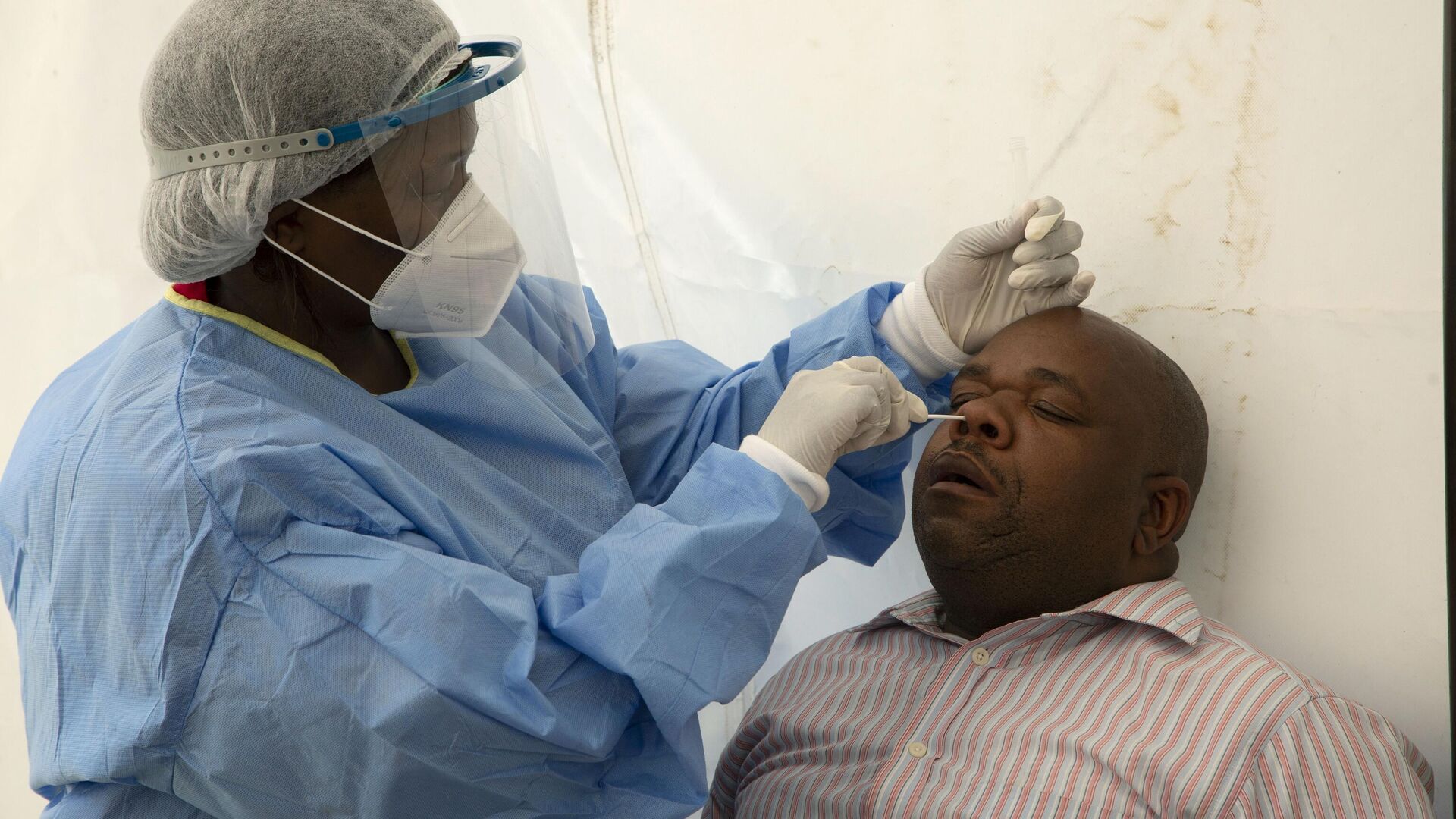https://en.sputniknews.africa/20221209/1058782316.html
African Nations Better Prepared for Future Outbreaks Following COVID-19
African Nations Better Prepared for Future Outbreaks Following COVID-19
Sputnik Africa
African countries are preparing their health infrastructure to be “much readier” for any future crises in the aftermath of the ongoing COVID-19 pandemic, said Matshidiso Moeti, the World Health Organization (WHO)’s Africa regional director.
2022-12-09T11:11+0100
2022-12-09T11:11+0100
2023-12-02T10:34+0100
sub-saharan africa
world health organization (who)
vaccine
healthcare
pandemic
https://cdn1.img.sputniknews.africa/img/07e7/04/16/1058782480_0:160:3073:1888_1920x0_80_0_0_4d432f63529fccfa343b7e370433194b.jpg
African countries are preparing their health infrastructure to be “much readier” for any future crises in the aftermath of the ongoing COVID-19 pandemic, said Matshidiso Moeti, the World Health Organization (WHO)’s Africa regional director on Thursday.Since the beginning of the coronavirus pandemic in 2019, governments all across Africa have been investing in their health systems and increasing their capacities, Moeti said. She also noted that after overcoming the pandemic, African nations continued ramping up their efforts to strengthen their health institutions, attempting to close all the gaps revealed during the pandemic, including training health workers on how to respond adequately to similar outbreaks.Moeti noted that one of the “most exciting outcomes of the struggle” the continent faced in obtaining COVID-19 vaccines for its people is that some nations have already found ways to develop their capabilities and obtain necessary technologies for local vaccine production.The WHO Africa regional office director highlighted that in order to keep the gains from the coronavirus pandemic response, there is a lot of work that needs to be done in the African healthcare systems.Meanwhile, Gambia’s Health Minister Ahmadou Lamin Samateh said the COVID-19 pandemic was “very difficult” for the health system in her country, as well as in many countries across Africa. She admitted that the pandemic was “an eye-opener for all of us to know where the gaps have been,” calling on the international community to support the continent’s effort to build its health infrastructure to withstand future pandemics.As of December 2022, almost three years since the African continent first encountered the coronavirus (COVID-19) in mid-February 2020, the number of infection cases registered in the African continent is around 9.5 million, according to the World Health Organization.South Africa was in the lead of African countries with the biggest number of cases, followed by Morocco, Tunisia, and Egypt in the Northern part of the continent. The death toll across Africa nears 175,000 people.
Sputnik Africa
feedback@sputniknews.com
+74956456601
MIA „Rossiya Segodnya“
2022
Muhammad Nooh Osman
https://cdn1.img.sputniknews.africa/img/07e7/04/0a/1058467512_0:0:1280:1280_100x100_80_0_0_ec723833bcbfcaed2e21952965ad99e4.jpg
Muhammad Nooh Osman
https://cdn1.img.sputniknews.africa/img/07e7/04/0a/1058467512_0:0:1280:1280_100x100_80_0_0_ec723833bcbfcaed2e21952965ad99e4.jpg
News
en_EN
Sputnik Africa
feedback@sputniknews.com
+74956456601
MIA „Rossiya Segodnya“
Sputnik Africa
feedback@sputniknews.com
+74956456601
MIA „Rossiya Segodnya“
Muhammad Nooh Osman
https://cdn1.img.sputniknews.africa/img/07e7/04/0a/1058467512_0:0:1280:1280_100x100_80_0_0_ec723833bcbfcaed2e21952965ad99e4.jpg
world health organization (who), africa, covid-19 pandemic, health infrastructure
world health organization (who), africa, covid-19 pandemic, health infrastructure
African Nations Better Prepared for Future Outbreaks Following COVID-19
11:11 09.12.2022 (Updated: 10:34 02.12.2023) Muhammad Nooh Osman
Writer/Editor
The crisis became an "eye-opener” for many nations, especially in Africa, where health infrastructure has proven to be in need of more investment in order to resist future outbreaks.
African countries are preparing their health infrastructure to be “much readier” for any future crises in the aftermath of the ongoing COVID-19 pandemic, said Matshidiso Moeti, the World Health Organization (WHO)’s Africa regional director on Thursday.
Since the beginning of the coronavirus pandemic in 2019, governments all across Africa have been investing in their health systems and increasing their capacities, Moeti said. She also noted that after
overcoming the pandemic, African nations continued ramping up their efforts to strengthen their health institutions, attempting to close all the gaps revealed during the pandemic, including training health workers on how to respond adequately to similar outbreaks.
“The future, however difficult the past couple of years have been, will find us in a much better situation in terms of our strategies, our investments and our capacities to confront public health threats,” the WHO official said. “We know now what we need to do to be able to make sure that our systems are resilient to the impact of a shock like an outbreak.”
Moeti noted that one of the “most exciting outcomes of the struggle” the continent faced in obtaining COVID-19 vaccines for its people is that some nations have already found ways to develop their capabilities and obtain necessary technologies for local vaccine production.
“Whatever happens in the future, the next pandemic will find the world and Africa much readier,” Moeti said, adding that she is optimistic about the partnership between African governments and the WHO. This partnership resulted in more health institutions being established in Africa “to take the lead to work in the area of preparedness and also in primary healthcare.”
The WHO Africa regional office director highlighted that in order to keep the gains from the coronavirus pandemic response, there is a lot of work that needs to be done in the African healthcare systems.
“As we move into 2023, it’s time to bring COVID-19 out of emergency response mode [and] integrate it into routine healthcare,” she added.
Meanwhile, Gambia’s Health Minister Ahmadou Lamin Samateh said the COVID-19 pandemic was “very difficult” for the health system in her country, as well as in many countries across Africa. She
admitted that the pandemic was “an eye-opener for all of us to know where the gaps have been,” calling on the international community to support the continent’s effort to build its health infrastructure to withstand future pandemics.
“National governments have roles to play but international communities have important roles to play as well,” Samateh said. “We’ve seen in the COVID-19 pandemic that one problem in one part of the world is a problem for the entire world.”
As of December 2022, almost three years since the African continent first encountered the coronavirus (COVID-19) in mid-February 2020, the number of infection cases registered in the African continent is around 9.5 million, according to the World Health Organization.
South Africa was in the lead of African countries with the biggest number of cases, followed by Morocco, Tunisia, and Egypt in the Northern part of the continent. The death toll across Africa nears 175,000 people.


